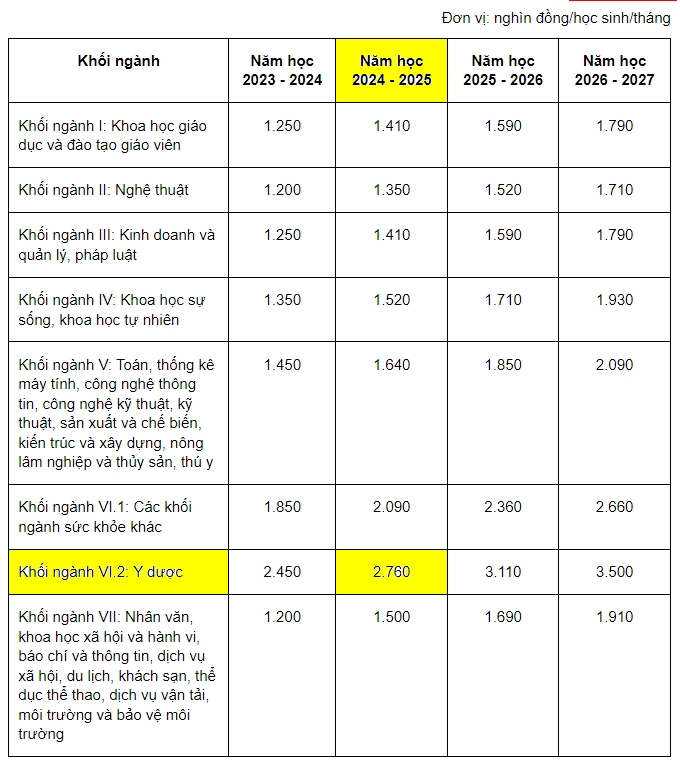What are the tuitions for the medical and pharmaceutical major at public universities covering their own recurrent expenditures in Vietnam for the academic year 2024-2025?
What is the tuition for the medical and pharmaceutical major at public universities in Vietnam for the academic year 2024-2025?
Based on Clause 2, Article 11 of Decree 81/2021/ND-CP, amended by Point b, Clause 3, Article 1 of Decree 97/2023/ND-CP, it is stipulated as follows:
Tuitions for higher education
...
2. Tuitions from the academic year 2023-2024 to the academic year 2026-2027 are as follows:
...
b) Public higher education institutions covering their own recurrent expenditures: tuitions are determined at a maximum rate of twice the ceiling tuitions at point a of this clause corresponding to each educational major and each academic year;
...
According to the regulations, the tuitions for the medical and pharmaceutical major at public universities covering their own recurrent expenditures for the academic year 2024-2025 are determined at a maximum rate of twice the ceiling tuitions for the medical and pharmaceutical major at public higher education institutions that do not ensure regular expenditures.
Specifically, the ceiling tuitions of public higher education institutions that do not ensure regular expenditures for the medical and pharmaceutical major for the academic year 2024-2025 are as follows:

Thus, the maximum tuitions for the medical and pharmaceutical major at public universities covering their own recurrent expenditures are 2,760,000 VND/student/month x 2 = 5,520,000 VND/student/month.

What are the tuitions for the medical and pharmaceutical major at public universities covering their own recurrent expenditures in Vietnam for the academic year 2024-2025? (Image from the Internet)
Which students are eligible for a 70% tuition reduction in Vietnam?
Based on Article 16 of Decree 81/2021/ND-CP, the tuition reduction and support policies include:
Subjects eligible for tuition reduction and support for tuitions
- The subjects eligible for a 70% tuition reduction include:
a) Students of traditional and specialized arts in vocational education institutions, public and private higher education institutions that provide cultural and artistic education, including: Traditional drama musicians, traditional Hue musicians, Southern amateur music performers, stage drama actors, folk performance arts, ca tru arts, bai choi arts, traditional musical instrument performers;
b) Students of the specialized arts of court music, cheo, tuong, cai luong, dance, circus; certain professions requiring heavy, hazardous, and dangerous labor in vocational education according to the list of heavy, hazardous, and dangerous occupations stipulated by the Ministry of Labor, Invalids, and Social Affairs;
c) Kindergarten children and students who are ethnic minorities (other than very few ethnic minorities) in extremely difficult communes/villages, region III ethnic and mountainous areas, extremely difficult coastal and island areas as stipulated by competent authorities.
- The subjects eligible for a 50% tuition reduction include:
a) Kindergarten children and students who are children of officials and public employees, workers whose parents have suffered a labor accident or occupational disease and are receiving regular allowances;
b) Kindergarten children and general education students, learners at regular educational institutions following the general education program whose parents or guardians, or grandparents (in the case of living with grandparents) belong to near-poor households as stipulated by the Prime Minister of the Government of Vietnam.
- The subjects eligible for tuition support: Primary school students in private educational institutions in areas where there are not enough public schools, are provided with tuition support by the State.
Thus, students studying the following majors are eligible for a 70% tuition reduction:
- Studying the following majors in vocational education institutions, public and private higher education institutions that provide cultural and artistic education, specifically:
+ Traditional drama musicians;
+ Traditional Hue musicians;
+ Southern amateur music performers;
+ Stage drama actors;
+ Folk performance arts;
+ Ca tru arts;
+ Bai choi arts;
+ Traditional musical instrument performers;
- Studying the following specialized majors:
+ Court music, cheo, tuong, cai luong, dance, circus;
+ Certain professions requiring heavy, hazardous, and dangerous labor in vocational education according to the list of heavy, hazardous, and dangerous professions stipulated by the Ministry of Labor, Invalids, and Social Affairs;
What are the principles for determining tuitions for public higher education institutions in Vietnam?
Based on Clause 3, Article 8 of Decree 81/2021/ND-CP, the principles for determining tuitions for public higher education institutions are as follows:
- Public higher education institutions partially covering their own recurrent expenditures and public higher education institutions assured by the State for regular expenditures (referred to as public higher education institutions that do not ensure regular expenditures) determine tuitions not exceeding the ceiling tuitions at point a, clause 1 and point a, clause 2, Article 11 of Decree 81/2021/ND-CP;
- Public higher education institutions ensuring regular and investment expenditures, public higher education institutions ensuring regular expenditures determine the tuition rates for each major according to the adjustment coefficients in comparison to the ceiling tuitions stipulated for public higher education institutions that do not ensure regular expenditures as stipulated in clause 2, Article 11 of Decree 81/2021/ND-CP;
- For training programs of public higher education institutions achieving quality accreditation standards according to the standards stipulated by the Ministry of Education and Training or achieving quality accreditation standards according to foreign or equivalent standards, the higher education institution is allowed to self-determine the tuition rates of the program based on the economic-technical norms issued by the higher education institution, publicly explain to learners and society.

